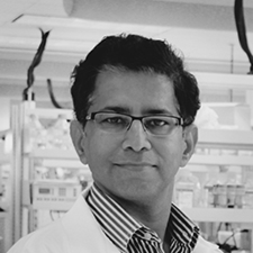
By Alvin Powell
Harvard Gazette
Drug resistance is the leading cause of death in women with estrogen-receptor-positive breast cancer, the most common form of the disease. Now, researchers have identified an ordinary dietary element that may increase the chances of a breast cancer becoming drug-resistant.
The connection of the amino acid leucine — found in foods such as beef, pork, chicken, fish, dairy products, and beans — to drug resistance raises hopes that a relatively simple intervention, like a shift to a low-leucine diet, can reduce the incidence of drug resistance, which is responsible for a large portion of the roughly 40,000 breast cancer deaths every year.
The work also raises the possibility that a drug could be developed to mirror the effects of that dietary restriction, by blocking cells’ ability to take in leucine from the surrounding environment.
Senthil Muthuswamy, an associate professor of medicine at Harvard Medical School and director of the cell biology program at the Cancer Center at Beth Israel Deaconess Medical Center, said scientists in his lab have already begun experiments with mice to see whether dietary changes can make a difference in the disease’s course. They’re also exploring whether an experimental drug already in clinical trials for another purpose can block tumor cells’ ability to take up leucine.

“A lot of women are dying because of this condition,” Muthuswamy said. “So if you can have any impact on that cohort, whether it is through a drug or simple dietary manipulations combined with some other treatment, that would be huge. I would be ecstatic.”
The research was led by Muthuswamy and funded by a grant from the National Institutes of Health and the Breast Cancer Research Foundation. It was conducted by team that included research fellow Yasuhiro Saito, first author of a paper published recently in the journal Nature, and colleagues from Beth Israel, the Dana-Farber Cancer Institute, Keio University in Japan, the Princess Margaret Cancer Centre in Toronto, and the University of Toronto.
The potential interventions would apply to estrogen-receptor-positive, or ER+, breast cancer, which accounts for about 70 percent of the approximately 260,000 annual cases in the U.S. ER+ breast cancer cells are nurtured by the hormone, so estrogen-blocking drugs such as tamoxifen have been developed to stop their growth and spread.
But, Muthuswamy said, resistance to tamoxifen and other estrogen-blocking drugs is a major cause of recurrence and metastases. Once resistance can keep any of the available estrogen-blocking drugs from working, death usually follows in two to three years.
“It’s really a horrible state at that point,” Muthuswamy said. “I was driven by that and trying to see if this would provide any insight into endocrine resistance, because I’m very interested in trying to help those patients.”
Muthuswamy and his team found that tamoxifen-resistant breast cancer counters the drug’s effects by increasing its intake of leucine, an amino acid that the body normally uses to make proteins and that must be consumed in food. In experiments on mice seeded with tamoxifen-resistant breast cancer cells, researchers found that blocking leucine from entering the cells resulted in the resistant tumors shrinking.
The work grew out of a general investigation of how ER+ breast cancer cells respond to a stressful environment. Researchers first found that cells increased their use of leucine, and as the scientists explored the relationship between leucine and breast cancer cells, they found that a molecule called SLC7A5 on the cell surface plays a key role by transporting leucine from the surrounding environment into the cells.
They also found that when leucine was scarce in the environment, cells moved more SLC7A5 to the cell surface, and that tamoxifen-resistant cells had more SLC7A5 on their surface than nonresistant cells did. Cells with extra SLC7A5 on their surface were able to grow and divide even in leucine-poor environments.
In addition to the follow-up clinical research already begun, Muthuswamy said his lab is investigating basic science questions, such as the mechanism by which leucine nourishes cancer cells and how the transporter molecule SLC7A5 moves from within the cell to the cell surface.
Muthuswamy said he is excited by the findings and by the prospect that positive results in the next phase of investigation could result in the rapid transition to the clinic of a new tool to fight ER+ breast cancer. Oncologists, he said, are routinely asked by patients whether a particular diet will help, and perhaps they will soon be able to give a more hopeful answer.
“Invariably, almost all physicians tell them, ‘Just eat a healthy diet,’” Muthuswamy said. “Managing endocrine resistance is one of the biggest clinical problems in breast cancer.”
(Reprinted with permission from Harvard Gazette.)













